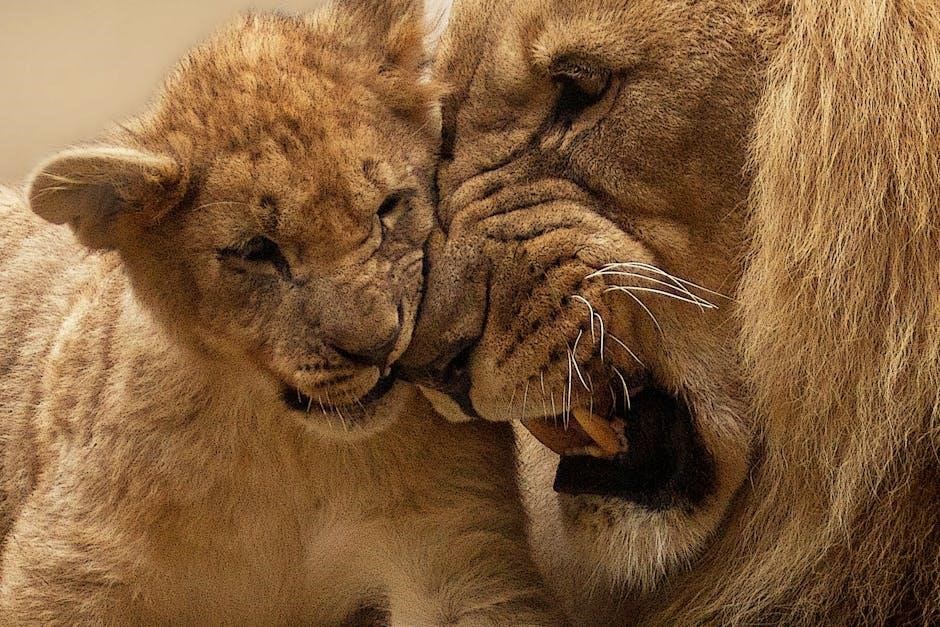The Cub Scout Oath and Law are foundational principles guiding Scouts’ behavior and decision-making․ Established over a century ago, they remain timeless, fostering ethical growth and moral development in young people․ Understanding and living these principles is essential for personal growth and contributing positively to society․
1․1․ Overview of the Cub Scout Oath and Law
The Cub Scout Oath and Law are guiding principles for Scouts, emphasizing duty, honor, and service․ The Oath is a promise to do one’s best, while the Law outlines 12 virtues like trustworthiness and respect․ These principles aim to foster ethical behavior and moral growth․ Scouts are encouraged to live these values daily, creating a foundation for responsible citizenship and personal integrity․ Together, they inspire young people to act with kindness, honesty, and courage, shaping their character and preparing them for life’s challenges․ The Oath and Law are essential tools for fostering positive change in Scouts and their communities․
1․2․ Importance of the Oath and Law in Cub Scouting
The Cub Scout Oath and Law are vital for instilling moral values and ethical behavior in young Scouts․ They serve as a cornerstone for personal growth, teaching Scouts to be responsible, respectful, and compassionate․ By living these principles, Scouts develop strong character, which helps them navigate life’s challenges․ The Oath and Law also foster unity among Scouts, creating a shared sense of purpose․ They provide a clear guide for making positive choices and contributing to their communities․ Understanding and embracing these values helps Scouts become ethical leaders and active citizens, prepared to make a difference in the world․

The Cub Scout Oath
The Cub Scout Oath is a promise to uphold values like duty, God, and country, guiding Scouts’ behavior and decisions, fostering personal growth and ethical values․
2․1․ The Text of the Cub Scout Oath
The Cub Scout Oath is a promise Scouts make to guide their actions and decisions․ It states:
“I promise to do my best, to do my duty to God and my country, to help other people, and to obey the Law of the Pack․”
This oath emphasizes loyalty, responsibility, and service, providing a clear moral compass for young Scouts․ Each line reflects core values designed to inspire character development and a sense of purpose․ Understanding and reciting the oath is a fundamental part of Cub Scouting, fostering commitment to personal and community growth․
2․2․ Meaning and Significance of the Oath
The Cub Scout Oath holds profound meaning, shaping the moral and ethical foundation of young Scouts․ It signifies a commitment to personal growth, duty to God and country, and a promise to serve others․ By reciting the oath, Scouts pledge to uphold values such as honesty, respect, and responsibility․ This promise fosters a sense of accountability and integrity, guiding Scouts in their daily lives․ The oath’s significance lies in its ability to instill lifelong principles, helping youth develop into compassionate and ethical individuals who positively impact their communities․
2․3․ How to Live the Oath in Daily Life
Living the Cub Scout Oath in daily life involves applying its principles consistently․ Scouts can demonstrate honesty by always telling the truth and being reliable․ Serving others can be as simple as helping a family member or volunteering in the community․ Duty to God and country encourages Scouts to respect their faith and community, while striving to improve their surroundings․ By practicing these values, Scouts develop integrity, empathy, and a strong moral compass․ Small actions, like holding the door for someone or cleaning up litter, show how the oath can guide everyday choices and positively impact those around them․

The Cub Scout Law
The Cub Scout Law consists of 12 points that guide behavior, emphasizing trustworthiness, loyalty, and helping others, fostering ethical conduct in everyday life․
3․1․ The 12 Points of the Cub Scout Law
The Cub Scout Law outlines 12 core values: trustworthy, loyal, helpful, friendly, courteous, kind, obedient, cheerful, thrifty, brave, clean, and reverent․ These principles guide Scouts’ actions and decisions, fostering ethical behavior and character development․ Each point serves as a moral compass, encouraging Scouts to act responsibly and compassionately in their daily lives․ By internalizing these values, Scouts learn to respect others, contribute positively to their communities, and uphold the highest standards of integrity and kindness․ These teachings remain central to the Scout movement, shaping young lives for generations․
3․2․ Understanding the Principles Behind the Law
The Cub Scout Law embodies 12 timeless principles designed to guide Scouts in developing strong moral character․ Each point, such as being “trustworthy” or “kind,” serves as a foundation for ethical decision-making․ These principles encourage Scouts to act with integrity, respect others, and contribute positively to their communities․ By understanding and embracing these values, Scouts learn to navigate life’s challenges with confidence and compassion․ The Law fosters responsibility, empathy, and self-discipline, helping young people grow into individuals who uphold high standards of behavior and make a positive impact in the world around them․
3․3․ Practical Examples of Living the Law
Practical examples of living the Cub Scout Law include demonstrating trustworthiness by keeping promises and being honest․ Scouts show loyalty by supporting friends and family․ Helpful actions, like assisting neighbors or volunteering, embody the law․ Being friendly and courteous involves greeting others warmly and listening actively․ Kindness is shown through sharing or comforting someone․ Obedience is practiced by following rules at home or school․ Cheerfulness can be maintained through positive attitudes․ Thrifty Scouts save money or donate to causes․ Bravery is shown by trying new challenges, while cleanliness involves caring for belongings․ Reverence is demonstrated by respecting nature or participating in community service․

The Difference Between the Cub Scout Promise and the Scout Oath
The Cub Scout Promise is tailored for younger Scouts, focusing on simpler, age-appropriate principles, while the Scout Oath provides a more detailed moral framework for older Scouts․
4․1․ Historical Context and Evolution
The Cub Scout Promise and Scout Oath have evolved over time to align with societal values and Scouting’s mission․ Historically, the Cub Scout Promise was designed for younger Scouts, emphasizing simplicity and age-appropriate principles․ In 2012, the Boy Scouts of America updated the Cub Scout Promise to match the Scout Oath, creating consistency across programs․ This change aimed to provide a seamless transition for Scouts as they advanced․ The evolution reflects the organization’s commitment to maintaining relevant and unifying values while addressing the needs of diverse membership․ This adjustment ensures clarity and continuity in Scouting’s ethical framework․
4․2․ Key Differences in Content and Purpose
The Cub Scout Promise and Scout Oath differ in content and purpose․ The Cub Scout Promise is simpler, focusing on doing one’s best, helping others, and being kind․ It is tailored for younger Scouts, emphasizing basic values․ In contrast, the Scout Oath is more detailed, highlighting duties to God, country, and others․ It also includes obedience to the Scout Law, making it a broader commitment․ The Scout Oath is designed for older Scouts, preparing them for more complex responsibilities․ Both serve to guide ethical behavior but cater to different age groups and maturity levels within the Scouting program․

Teaching the Cub Scout Oath and Law to Young Scouts
Engage young Scouts with age-appropriate methods, such as memorization games and activities․ Leaders and parents play a key role in guiding Scouts to understand and live these principles․
5․1․ Age-Appropriate Methods for Memorization
Teaching the Cub Scout Oath and Law to young Scouts requires engaging methods tailored to their age and learning style․ Repetition is key; reciting the Oath and Law during meetings helps reinforce memory․ Visual aids, such as posters or flashcards, can break down the content into manageable parts․ Leaders can incorporate games, songs, or skits to make learning fun and interactive․ For younger Scouts, simplifying the language or focusing on key phrases can aid understanding․ Encouraging Scouts to practice at home with families also reinforces memorization in a supportive environment․
5․2․ Activities to Reinforce the Oath and Law
Engaging activities help Scouts internalize the Oath and Law․ Group discussions and role-playing scenarios allow Scouts to explore real-life applications of these principles․ Creating visual reminders, such as posters or memory jars, reinforces key points․ Games like matching games or scavenger hunts focused on the Oath and Law make learning fun․ Service projects, such as community cleanups, demonstrate the practical impact of living these values․ Leaders can also incorporate storytelling or skits to illustrate how the Oath and Law guide decision-making in everyday situations, helping Scouts connect these principles to their own experiences․
5․3․ The Role of Leaders and Parents in Guiding Scouts
Leaders and parents play a vital role in guiding Scouts to understand and live by the Oath and Law․ They should model these principles themselves, creating a positive example for Scouts to follow․ Consistently reinforcing the importance of honesty, respect, and responsibility helps Scouts internalize these values․ Leaders can facilitate discussions and activities that connect the Oath and Law to real-life scenarios․ Parents should encourage their children to apply these principles at home and in their communities․ Through collaborative efforts, leaders and parents help Scouts develop a strong moral foundation and a commitment to ethical behavior․ Positive feedback and encouragement are essential for fostering growth․
The Role of the Cub Scout Oath and Law in Character Development
The Cub Scout Oath and Law foster ethical growth and moral development, teaching Scouts to be trustworthy, loyal, and helpful, shaping their character for a lifetime․
6․1․ Building Ethical and Moral Foundations
The Cub Scout Oath and Law provide young scouts with a clear moral compass, teaching them to be trustworthy, loyal, and helpful․ These principles encourage ethical decision-making and responsibility, fostering a strong sense of right and wrong․ By internalizing these values, scouts develop a foundation for lifelong character growth, learning to respect others and contribute positively to their communities․ The Oath and Law serve as daily reminders to act with integrity, guiding scouts through challenges and helping them become compassionate and responsible individuals․
6․2․ Fostering Responsibility and Accountability
The Cub Scout Oath and Law emphasize the importance of responsibility and accountability, teaching scouts to take ownership of their actions․ By promising to do their best and obey the Law, scouts learn to be reliable and answerable for their decisions․ This sense of duty extends beyond scouting activities, encouraging scouts to take initiative in their daily lives and communities․ Accountability is reinforced through activities that promote teamwork and leadership, helping scouts understand the impact of their choices and inspiring them to act with integrity and purpose․
6․3․ Promoting Teamwork and Respect for Others
The Cub Scout Oath and Law encourage scouts to value teamwork and respect for others․ By emphasizing loyalty, friendliness, and courtesy, the Law fosters a sense of unity and cooperation among scouts․ Activities such as group projects and community service teach scouts to collaborate effectively and appreciate diverse perspectives․ Respect is cultivated through inclusive behaviors and empathy, helping scouts build strong relationships and work together toward common goals․ These principles not only enhance teamwork but also prepare scouts to be considerate and supportive members of their communities, reflecting the values of scouting in their interactions with others․
The Cub Scout Oath and Law are timeless principles that guide young Scouts, fostering ethical behavior, responsibility, and respect for others․ They inspire Scouts to become compassionate and responsible citizens, preparing them for future challenges while upholding the values of scouting․
7․1․ Summary of Key Points
The Cub Scout Oath and Law are essential principles that guide Scouts in their daily lives, emphasizing trustworthiness, loyalty, and kindness․ The Oath focuses on duty to God, country, and others, while the Law outlines 12 points for ethical behavior․ These principles are taught through memorization, activities, and leadership, fostering moral growth and responsibility․ By living the Oath and Law, Scouts develop strong character, teamwork skills, and respect for others, preparing them to become compassionate and responsible citizens․ These values remain central to scouting, inspiring Scouts to make positive impacts in their communities and beyond․
7․2․ Final Thoughts on the Importance of the Oath and Law
The Cub Scout Oath and Law are timeless principles that shape young lives by fostering ethical decision-making and moral integrity․ They provide a clear guide for Scouts to act with honesty, kindness, and responsibility․ By embracing these values, Scouts develop strong character, leading to positive contributions in their communities․ The Oath and Law are not just words but a way of life, inspiring Scouts to strive for excellence and service․ Their enduring relevance ensures they remain a cornerstone of scouting, preparing youth to navigate life’s challenges with confidence and compassion․